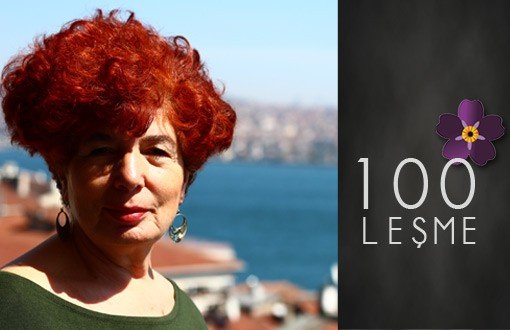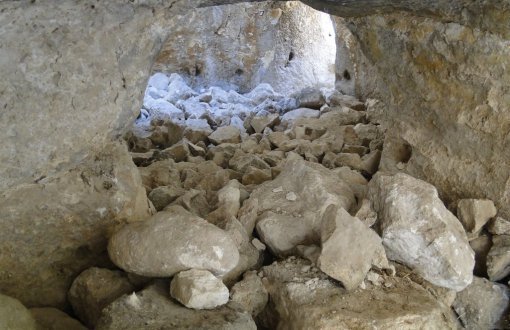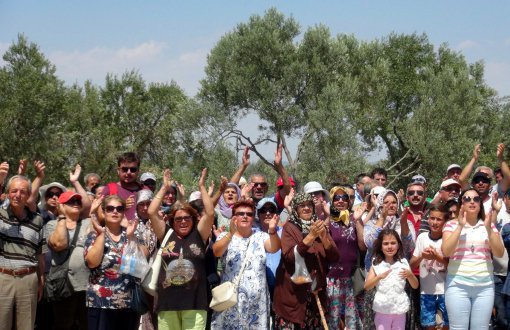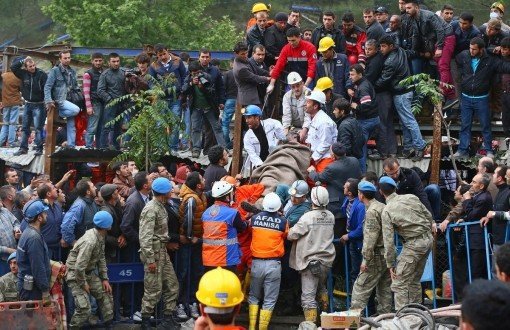CONFRONTATİON/ ARŞALUYS KAYIR
"Breathlessness is a Relic for Us”

Prof. Dr. Arşaluys Kayır is the first name that comes to mind when you think about the sexual problems, especially “vaginismus treatment” in Turkey.
Retired professor at Istanbul University Faculty of Medicine, Kayır is a psychotherapist, a psychodramatist, a couple and group therapist, and a sex psychotherapist.
Her patients told their very private “secrets” to Kayır, age 70, for years. In return this, while she treated her patients, she also told to the society that sex, the sexual problems are not a taboo, and women have right to moan and scream in bed as well.
This time, we applied to Prof. Dr. Arşaluys Kayır not for consulting her on sexual issues, one of the most common of taboos in Turkey, rather for learning her history regarding the other taboo of Turkey, Armenian question.
Where are you from?
My mother is from Harput city (Elazığ province), and my father is from Kığılı (Bingöl province). I’m the 8th and the last child of my family. Until age 6, I lived in Kığılı, a city in which only two Armenian families stayed. Later, I went two times to the lands which I live in there for five years, and never forget. The effects of the migration cannot be underestimated. In 1915, both my mother and father had no relatives to survive.
My grandmother had died on the way in front of my mother, her sister had slipped through her fingers and lost. At age 7 or something, my mum dropped by in an American Orphanage in Harput. My father adopted by a Muslim family, but ran away, and then he also dropped by in Harput orphanage. We were born from the two survived ones. Our foundation based on the losses.
I have been living in Istanbul since age 6. At the year of 1952, what a lot of Armenian and Greek people was living in Üsküdar, Bağlarbaşı district. The schools and the churches were full of people. We were nourished by baptismal days, weddings, Noel, Easter, name days, piano sounds from houses, sounds of rings and choirs in the churches. Afterwards, other sounds raised, these sounds were turned down, and decreased one by one. On September 6th-7th, the flames rose from the area where the Armenian and Greek schools and the churches located, and my laments; “my school is burning”.
I went to Semerciyan Cemaran primary school. Even though my family spoke Armenian, I didn't speak in my mother tongue until going to primary school. When I couldn’t speak Armenian in the school, I realized that I'm Armenian. I got shocked. Which unconscious fear did lead me not to speak Armenian in Anatolia?
I can speak Turkish and even English better than Armenian. I received education in Üsküdar American Academy. I didn’t slow down, even if I met up by an Armenian at every step. Now, having an original Armenian name makes me glad ever increasingly. When someone asks “What is the meaning of your name?”, “What an interesting name!”, I reply “It is not interesting, It’s an Armenian name and means dawn”. The feeling of being rare is painful.
Did your family talk about the past?
Our family has consisted of just my mum and my father, the only survived ones. The silence prevailed. They were speechless. We weren’t used to ask as well. How could we grow up without asking, I don’t know. Only my mum would cry, when she listened the song "Yeter ki gel bana senede bir gün" (If only for a day in a year, come to me), this song was something like a prayer for her. She would look for her lost sister in this song. For years, my mother mourned for her sister, and she couldn’t see her. She was telling the story as “My mother died during the national mobilization period, my sister lost”. After many years, she learned that her sister was in Yerevan. However, those days it was not so easy to go to the Soviets. When she just received her passport, we learnt that her sister died.
My father, on the other hand, never talked about the past. I studied in psychology, normally I should have been curious and ask, shouldn’t I? Probably, we had a silent consensus; “it is forbidden to talk about that issue”. Now, we, me and my siblings, are trying to join our information on past. It is so few and in bits. For example, we know that my grandfather and uncle went to USA before 1915, but what happened to my grandfather? Lost information.
What kind of an urge is keeping in silence?
Silence is a reflection of suppressing anger, sorrow and despair. We can observe this in traumatized people. For instance, my mother is crying while listening the song "Senede bir gün", that’s just all. She was keeping in silence, it's a self-protection instinct. When you keep in silence, you forget as well and also your relatives cannot get to know. When you ask me, I feel as deaf and dumb. Why I didn’t learn that, yet I’m a curious person. Why did this curiosity not function on this issue?
For example, during childhood, when someone called his/her grandpa, aunt or uncle, I felt the absence of this emotional bond, and I wanted to be like them, because, I had no relatives. Years ago, during a group therapy session, when the group leader, a trauma specialist, asked “What does the word ‘trauma' bring to mind for you?” I profoundly said “migration” like awaking from sleep. Sorrow…It doesn't easily pass by.
When the book of Fethiye Çetin "My Grandmother" was published, my friends who are not Armenian called me up by crying. and said, “You probably read the book". I said, “I didn’t read and I won’t”. I didn't have enough courage to read. My sorrow would recur. Whereas I make my own way, I don’t want any obstacles on it. I just protect myself. That’s exactly the silence ‘mechanism’ and, I don't know whether I will overcome if I read. But now, I can read more bravely, and my endurance increased. Nonetheless, I know that I shouldn’t read before bed. That’s why, psychotherapies developed upon traumas.
How?
Breaking the silence became important. Previously, the reasons of the psychological traumas were known more or less, however, in our age it has become more important and developed. Now, whole world is talking about this. Trauma is something which makes you forget. You just simply forget, don’t remember. But now the world has begun to break its silence, to speak and confront. There is also social sadness along with personal sorrow as well. “Secret is like a bomb dropping to the home,” says psychoanalyst and psychodramatist Anne Schützenberger. She has studied on the Ancestor Syndrome and written many books. I also educated by her. For instance, when my mum told how my grandma was killed, she would say, “my mum was buried while she was breathing”. Since the very day, this “breathlessness" has been relics of our past. My mum suffered from short of breath, and I am also suffering. In psychotherapy, the individual explains her/his complaints and we get into the story. The silence breaks up bit by by, though we never instantly say ‘tell’. S/he tells her/his own story gradually and gets started to hear her/his own voice. Now, It’s the emotions who talks, not the mind. That’s the all point. When the mind talks too much, it doesn’t work; because the mind does not cure. If this ‘emotion’ method is adopted, the mental renewal would come about as well. Here and now, while I’m having a talk with you not I’m just telling; besides interactions are occurring. Having a “reciprocal” relationship by that link facilitates the change.
Confrontation is a type of therapy, a method of exposing to avoided thing. If you afraid from dogs, you are directly brought into contact with a dog. But then, it was turned out to be useless. Other methods were developed. Such as, at first drawing a dog picture or watching a dog movie. While confronting, in the first place, it is asked to have a reliable one nearby. Several exercises are given, and there exist different phases. When the confrontation method is used delicately, it would work however, it would lead to accusation instead of making realize the truth if used harshly.
Do you think, the confrontation is exercised in Turkey?
In fact, even when you utter the silence in the past, you already break it and it’s a step. Day by day, we talk about that. So, I’m glad for that. At least, the ignorance abates, as it’s also a kind of defense mechanism. All of us experience small denials in our life because, we want to be stronger and to not collapse. If, on the other hand, the level of the denial is overdone, we would pass the burden on someone else. In television programs, it is discussed even loudly; this is a well process in terms of being familiar. Sometimes it may get on my nerves, but it’s better than being concealed. Everyone, who wants to say a word about Armenians, can express.
The most annoying thing for me is to use the word ‘Armenian’ as a foreign word. For example, the sentences started with “allegedly Armenian” are said for years, the rest of the sentence does not matter, anyway I can’t listen the rest. When the word ‘allegedly’ is combined with ‘Armenian’, I think whether my family is lying. Are we backbiters? If I feel emotionally weak, almost I may even ask “or else, am I not Armenian”. In other words, asking "how we define, name" this experiences is not my business. Believing the healing effect of the process, I just say so; when you diagnose the illness, it does not recover automatically, on the other, a collaboration process start. In order to heal, a well treatment environment requires.
For instance, hearing the sentence “My grandmother is also Armenian” for quite some time is somehow therapeutic both for the ones said and us. Naturally, one may ask “If your grandmother is Armenian, aren't you deemed to be Armenian slightly?". But, if s/he says so, s/he feels like that, maybe when you give therapy, in the third session s/he would say, “I’m Armenian”. However, if you say, “You are also Armenian” directly to her/his face it doesn’t work.
How was your school life?
I remember we were intimidated at the school. When we misused a Turkish word, our Turkish-language teacher corrected us in a blaming manner. If the teacher rub your nose in it like this way, it doesn’t unite, instead split. We should properly speak Turkish. If you cannot say anything due to the fear of making a mistake, then you just silence.
Since I cannot do in a best way, I don’t neither write nor say the word ‘harikulade’ (marvellous). In the period of the campaign “Patriots, Speak Turkish”, for example you went out; you would automatically call your mother as 'mama', so you just keep silent, when you are out. The fear of punishment, don’t get into trouble, don’t blurt out… I feel sorrow, even when I’m talking about this, I should be grateful for not losing my own nature. This cruelty cannot be underestimated.
Greeks, for instance, used to talk more freely in public transportations. And, I would just wait for them to be silent. They should have, because something bad may happen. You see, I took offence at the one who intimidates, rather being intimidated. At the end, they went, migrated. Now, people say to me, “How surprising, we wouldn’t have guessed you are Armenian”. Well, I can speak Turkish fluently, so they say this like a compliment. But this is not a compliment. Because, I made such an effort to speak Turkish, such that I cannot speak Armenian well. However, I studied Armenian for six years. I live as a missing person. And, people like me are not few.
You are the first women professor in the discipline of minority psychology.Was that a tough process?
Being determined was rubbed my nose in it too much, but I didn’t give up. They supposed me to content myself. Our retired chief Yani Anastasiadis was a quite esteemed psychology assoc. professor. Another person, who had a doctorate degree, was going to substitute him. The exam for the position was held when I was not in Istanbul, and one of my friends, who completed his doctorate after me, filled the position. I visited the chairman. And I said, “Do I have any lack of skill, If I know I can fix it accordingly”. He replied, “No, we are pleased with you”. But then, when I asked, “Because of being Armenian?” the professor flushed.
After being assoc. professor, the difficulties were going on. Assoc. professors didn’t have to sign regarding their arrivals to work. I waited for the removal of my name from the signature list, when it wasn't removed I took offence, and I wrote a petition in order to make myself visible. The chairman summoned me to his room, “Will you make me to suffer a stroke? Aren't we, all of us, the children of muslims?,” he said. An Armenian student of mine says, “They won’t promote me”. He is right, but I am advising him to believe in his potential. Nowadays, it is not easy for me to pass through the corridor with the posters “End to Armenian lies”, going to the class.
For the first time, you brought up the sexual problems, one of the biggest taboos in Turkey, the vaginismus problem.You convinced that the sexual problems are a kind of psychological problem.
Yes, I just paved the way for taking this issue not lightly but seriously. People cannot easily talk about their sexual problems because, it’s a taboo. I just make visible the secrets of people. I make people to say it's not immoral, what’s wrong with that. I normalize the sex. I pay attention not to the organs, but instead the individuals and the feelings inside them. If men scream, women should be able to scream in bed as well. I always emphasize the equality, while I perform my profession.
Compared to 40 year ago, I am the witness of how it changed for both sides. The number of the relevant psychotherapists and the relevant patients has also increased. The taboo was broke for both sides. “Reciprocity” is valid for this case as well. The result concerning the effects on me is that the more I speak up on this issue, my psychotherapist identity came to the fore, but my Armenian and woman identity remained in place.
When did you visit the village you were born?
15-20 years ago, in my first visit, they took me to the home in which I grew up. A family was having a breakfast on the floor. Immediately, I crouched down and they handed over a cup of tea to me, the cup in my hands; I hanged on to the warmth of the cup and said I knew the cabinet inside. I remembered thanks to its brown color. The women said that she had taken the cabinet from Istanbul-Zeytinburnu when she had married and moved to there. I could have gone as far as to say “you are mistaken” to woman. Then, my mind returned back to the table and we resumed, she had also a migration story.
In 1915 people did not just die, they were split from their land as well. Everyone scattered in all directions. When I looked the trees once planted by my father, I felt as if my father was living. They behaved us like a tourist, but when I said, “I’m native, I’m from this land”, a close connection was established. Setting foot on land is important. During my first visit, when I couldn’t find our former house, they referred me to land registry office. Yet, I was looking for the house in which we had been tenant, just my childhood memories. I would like to concretize the things in my mind and to touch, so that I could relieve my longing of separation.
Dou you know, what did influence me when I went to Armenia? Well, it's great to hear everyone is speaking Armenian, but the names they gave to the districts. They named as ‘Antepliler’ (people from Antep province) district, 'Harputlular’ (people from Harput) neighborhood in which I sought my aunt’s grave and “yukarı Maraş”. While I was walking early in the morning, I said "pariluys" in Armenian, namely “good morning” to someone who was repairing his door. When I said that I came from Istanbul, he didn't please to hear that. “Do you know Adana, Maraş?,” he said. Immediately, I started to talk as being an Anatolian. He would like to feel the places which he heard from his grandfather. He was a stranger to Istanbul, after I left him I let my tears fall. The need of communication and connection for both me and him… That person can be either Greek or a Muslim who lives in there.
I, as being left behind, also witnessed the migration of many people all my life. People were going away by leaving all kitchen wares, nice antique furniture. So, I am not interested in new stuff/furniture. That’s why, my home, office room are decorated with the things that I don’t know their owners.
When I visited Kığılı second time, the church, which had been previously there, yet was not there. In Anatolia, great number of church, school had vanished. Burning the churches cause to erase my past. I don’t prefer to live in place, in which there exist no churches. It’s not related with being religious; I don’t want to forget my Armenian identity, because I’m forgetting day by day. The church is my memory.
You expect me to say final words, but I won’t. More naive words are pouring out of my mouth, when I keep on talking. Maybe that’s the crux of the matter. Giving a chance for ourselves to ease off. Because, the mind doesn’t work all the time…(NV)
* Click here to read this article in Turkish.
* This article is included within the bianet Confrontation article series. The Confrontation series consists of the interviews with Armenian and non-Armenian people living in Turkey. This article is the only one which is translated into English. You may read other articles of the series in Turkish.
Engineers Inspect Hasankeyf: Caves Damaged

Sexual, Physical Violence Against People With Disabilities Increase

Villagers on Watch in Çanakkale Against Geothermal Power Plants

Judge Replaced Ahead of Summary Judgement in Soma Trial

Most Miner Families Withdraw Complaint in Occupational Homicide Trial in Şirvan





